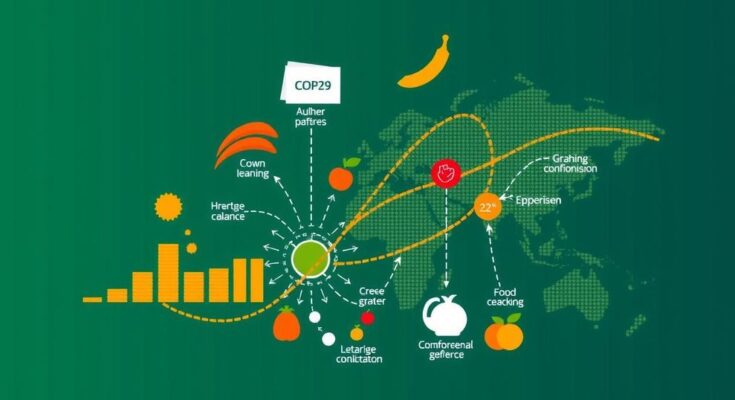COP29 in Baku, Azerbaijan focuses on urgent reforms in food systems amid climate change. Despite significant pledges at COP28, progress on agricultural emissions remains slow, with only a fraction of countries poised to update national climate plans. The Alliance of Champions for Food Systems Transformation signifies hope amid criticism of the UN’s roadmap delays. Challenges persist in altering dietary habits crucial for meeting climate targets.
The upcoming COP29, taking place in Baku, Azerbaijan, ignites global attention on climate change, particularly concerning the role of food systems in greenhouse gas emissions. Last year’s conference, COP28, marked a significant advancement as over 100 nations signed a declaration aimed at reforming their food sectors by 2025, addressing the alarming fact that food systems account for one-third of global emissions, predominantly due to meat production. Despite the pledges to integrate food systems into national climate plans, substantial progress remains elusive, with only 40 countries reportedly on track to meet revised commitments by the next conference in Belém, Brazil. Prominent figures, such as Edward Davey from the World Resources Institute, have voiced concerns over the lack of urgency in implementing these pledges, stressing that countries, including the UK, must significantly alter dietary practices to meet their net zero goals. The challenge is amplified by political sensitivities surrounding meat consumption and the broader implications of dietary changes for emission reduction targets in Global North nations. Despite funding commitments from corporations and foundations aimed at addressing food-related emissions, the United Nations’ proposed roadmap for food system transformation is criticized for delays and inadequate stakeholder engagement. Nevertheless, the Alliance of Champions for Food Systems Transformation (ACF) has emerged as a beacon of hope, bringing together diverse nations to collaboratively tackle their unique food system challenges. Noteworthy achievements, such as Sierra Leone’s sustainable agricultural reforms, highlight the potential for effective food system transformation in resource-constrained contexts. As COP29 convenes, stakeholders remain hopeful yet cautious, understanding that success hinges upon collective action and genuine commitment to food system changes across the globe.
The discussion on sustainable food systems has gained momentum as world leaders convene for the 29th annual United Nations Climate Change Conference (COP29). The need to address food systems in relation to climate change has become imperative, given that agricultural practices significantly contribute to greenhouse gas emissions. COP28 facilitated crucial agreements, such as the UAE Declaration on Sustainable Agriculture, urging countries to incorporate agricultural emissions into their national climate strategies. However, skepticism regarding the timely implementation of these commitments underscores the need for heightened accountability among participating nations. The unfolding challenges reflect a critical intersection of dietary habits, agricultural practices, and climate justice, necessitating a concerted effort to shift food systems towards sustainability while addressing the increasing global population’s needs within environmental limits.
In summary, as COP29 approaches, the imperative for nations to act on their food system pledges could not be clearer. The challenges surrounding dietary changes and agricultural emissions remain pressing, with many countries lagging behind in revising their climate commitments. Nevertheless, initiatives like the ACF demonstrate potential pathways for collaborative reform. The outcome of COP29 will reveal whether the global commitment to transforming food systems can be realized effectively and whether concrete solutions will emerge from these high-stakes discussions.
Original Source: impakter.com




